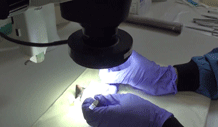
Due to the complexity of the systems we are analysing, mice play a necessary and integral role in increasing our understanding of how vaccines work.
How vaccines affect the immune system
Research to understand and improve how people are vaccinated against viruses is using mice to see how vaccines affect the immune system.
Researchers are looking at dengue fever and flu because these viruses can be worse if you have previously been exposed to a strain different from the one you currently have.
A University of Exeter researcher explained: “We know vaccines work but we don’t know how. If you are vaccinated against measles you develop an antibody memory and won’t get it again – but not all vaccines are that good.”
In this work looking at the fundamentals of antibody memory, mice are vaccinated then their tissues studied to see which immune cells are expressing antibodies. This is helping us understand how vaccines work and how to improve them.
The researcher added: “Due to the complexity of the systems we are analysing, the mice play a necessary and integral role in increasing our understanding of how the vaccines work. You are studying a system so you can’t do it in a tube”
“This kind of research is helping us improve vaccines and protect people against potentially life threatening viruses.”
The use of animals in any research undergoes robust scrutiny from both the internal Animal Welfare Ethical Review Board (AWERB) and a Home Office inspector before a project licence is granted.
